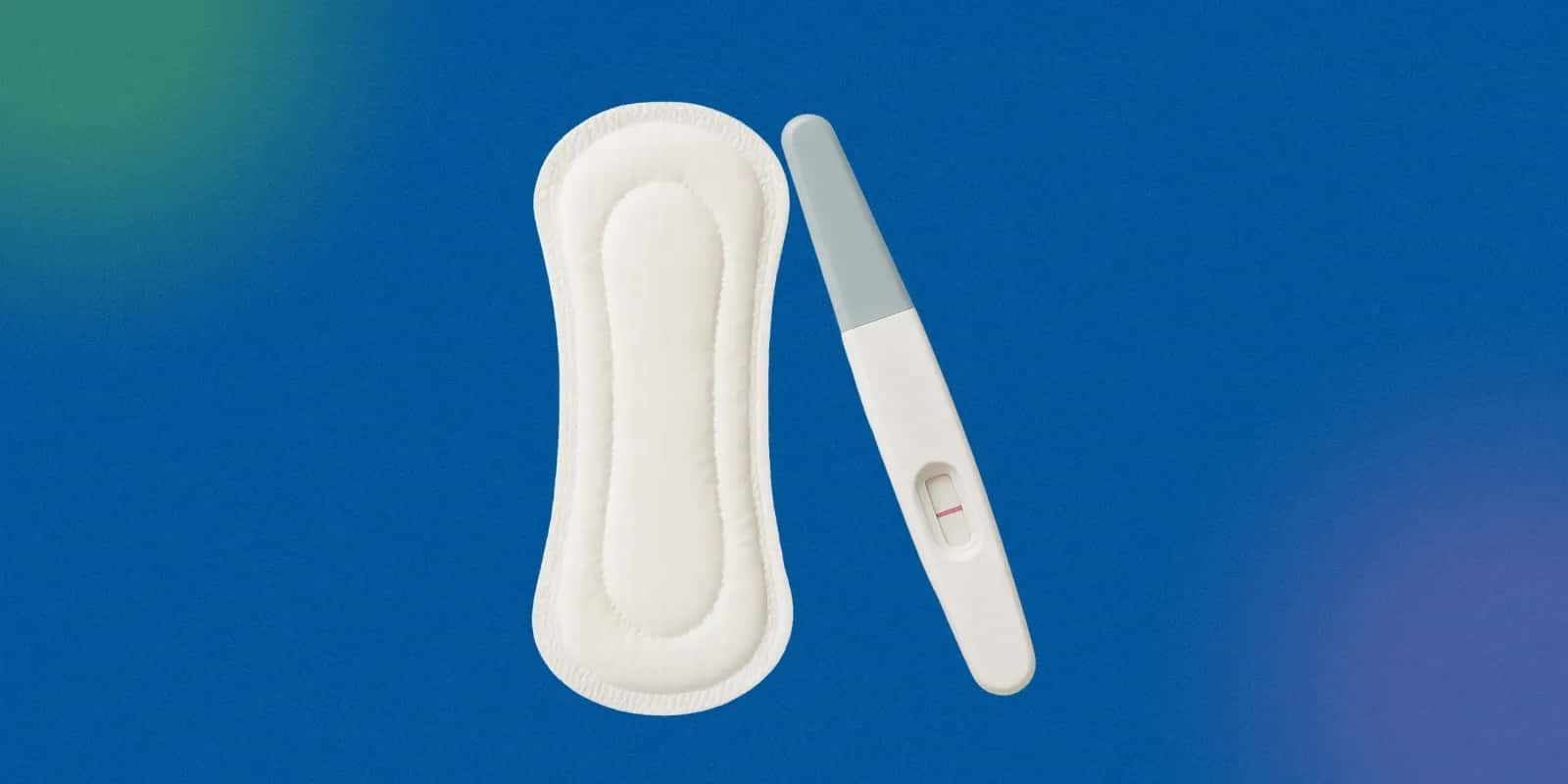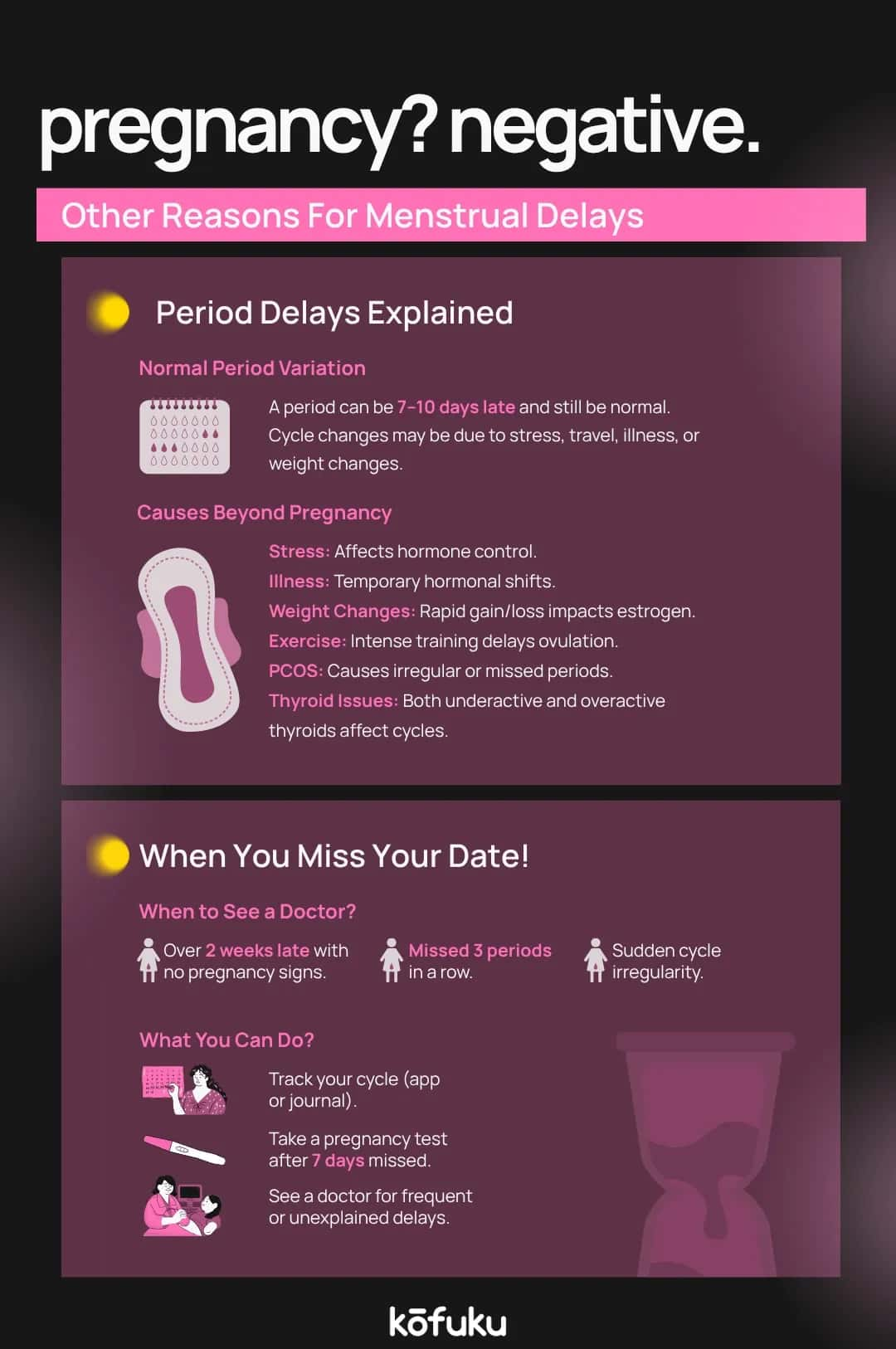How Late Can Your Period Be Without Pregnancy?

Introduction
Although some people get their periods like clockwork, the majority of women experience some change - it could be early or late. And while no woman likes getting their period, a late period causes alarm bells to go off in everyone’s head.
It could be due to many reasons - birth control, weight or hormonal changes, medical conditions, pregnancy, and more. Ever wondered how late periods can be before pregnancy becomes an option?
Generally, if your period is late by a day or two, there's no need to panic. Because, on average, menstrual cycles are 28 days long, but in some cases can also range from 21 to 35 days. A menstrual cycle is the length of time from day one of your period to day one of your next period.
A period that is just a few days late is not a cause to be concerned. That means a 28-day cycle and a 26-day cycle is probably nothing to worry about. But your period might be considered late if it's been more than 35 days since your last period. It can also be a sign of either pregnancy or an underlying condition that needs medical attention.
In this blog, we will look at many aspects of a late period, such as the symptoms of late periods, what is the maximum delay in periods if you are not pregnant, and should you worry if you missed five days of periods, the meaning of nagma and the causes, and many more things.
Understanding a Missed or Delayed Period
Your menstrual cycle is a finely tuned rhythm of hormonal signals that usually lasts between 21 to 35 days. A missed period refers to a period that is delayed, but it does not always indicate pregnancy.
Maximum delay in periods when not pregnant
A period could be late because of many causes, such as stress, sickness, exercise, or even weight changes, which affect the hormones. A couple of days' delay can mean two to three days, which is generally considered within the normal limit.
But if the delay is for five days or more, it's worth paying attention. If you miss your period by a week, you are in the grey zone; time for a deeper check at possible causes beyond pregnancy.
Can Sex Delay Your Period Even If You're Not Pregnant?
Many people wonder: Can having sex delay your period? The short answer is no. Sex does not cause a delay in menstruation. Although hormonal changes and lubrication changes could cause minor changes in the cycle, sex never has a direct effect on the shedding of the uterine lining.
That being said, if there's anxiety surrounding sex or unexpected pregnancy thoughts, stress hormones like cortisol could mildly affect timing. However, pregnancy still remains the primary sexual cause of a missed period.

Is a 5–7 Day Delay in Periods Normal?
Yes, in most cases, if your cycle is late by five to seven days, it is still within natural variation. However, if your menstrual period is usually on time (28 days is common), a one-week delay is abnormal and should be monitored and assessed by a doctor.
A menstrual log can help you identify patterns of your cycle and detect any delays quickly.
Common Causes of Period Delay (Besides Pregnancy)
Even if pregnancy is ruled out, there are several other factors that can affect your menstrual cycle, such as:
-
Stress and Emotional Imbalance: Elevated cortisol levels, the stress hormone, can interfere with the ovarian-hypothalamic axis. This can delay ovulation and menstruation.
-
Weight Fluctuation: Rapid loss or gain of weight can disrupt oestrogen production in the body. This results in delayed periods as energy balance is unstable.
-
Extreme Exercise: Intense training, such as preparing for a marathon or regular gym sessions, can suppress menstrual hormones, leading to delayed periods.
-
Dietary Changes: Reducing calories, essential fats or following a different diet than your normal can interrupt hormone production, leading to cycle delays.
-
Polycystic Ovary Syndrome (PCOS): PCOS is common in women of reproductive age and can cause irregular or skipped periods due to hormonal imbalance.
-
Thyroid Disorders: Hypothyroidism or hyperthyroidism often affects menstrual regularity.
-
Chronic Illness or Medications: Diabetes, depression, steroids, and even some psychiatric medications can lead to delayed periods. In some cases, any medication, even for cold and flu, can cause delayed periods if you are healthy and off any medications.
-
Perimenopause: Fluctuating hormones, especially in the late 30s and 40s, can result in skipped menstrual cycles.
-
Breastfeeding: The hormone prolactin, responsible for lactation in new mothers, suppresses ovulation, explaining why many nursing mothers don't get a regular period.
What Are the Symptoms of a Late Period?
Detecting a delayed period can happen by noticing the signs and symptoms that might be mistaken for pregnancy. These late-period symptoms include:
- Mild cramps and bloating
- Breast tenderness
- Mood swings
- Increased appetite or cravings
- Acne flare-ups
These late period symptoms overlap significantly with premenstrual syndrome, also known as PMS or early pregnancy sensations, emphasising the importance of a pregnancy test and knowing your menstrual patterns.
Can Exercise or Diet Delay Your Period?
Yes, exercise and diet both have the potential to delay ovulation, leading to a late or skipped period when physical demands or caloric restriction outpace the body’s hormonal capabilities.
Does Nagma Have Anything to Do with Period Delays?
Nagma, also known as vaginal itching or burning, is typically unrelated to period timing. However, certain infections, such as urinary tract infections, can be treated with antibiotics and may lead to delayed periods.
What Does 'Couple of Days' Really Mean in Period Tracking?
In period tracking, this usually indicate a two-day delay. This is a minor variation that often reflects acceptance cycle flexibility.

Tracking Your Period Accurately
Keeping an accurate record of your period is essential for understanding your cycle. Here’s how:
- Calendar Month: Mark start and end dates of each period.
- Symptom Diary: Record cramps, changes in breast size, mood, and intensity of the bleeding.
- Apps and Wearables: Certain tools like Clue or Flo can help you easily record menstrual details, allong you to easily detect patterns and shifts in your cycles.
- Basal Body Temperature Charting: This can help identify ovulation trends and late phases.
This tracking helps distinguish a maximum delay in a period if not pregnant from a genuine irregularity.
What Does '34 Weeks' Mean in Months During Pregnancy?
If you are wondering 34 weeks is how many months, it is approximately seven months and two to three weeks of pregnancy. This timeframe is unrelated to menstrual cycle periods, but may arise if confusion occurs during late pregnancy discussions.
What to Do If You’ve Missed Your Period but Know You’re Not Pregnant
Here is what you can do if you have missed your period but are sure that you are not pregnant:
- Take a Reliable Pregnancy Test: More than five days after you missed your period for peace of mind.
- Revisit Stress and Lifestyle: Stress, along with lifestyle factors such as sleep, diet, exercise and mental health, can lead to delayed periods.
- Consult a GP: If the delay is for more than two cycles, consult a gynaecologist immediately, especially if you experience any abnormal bleeding, pain or systemic symptoms.
When Should You Be Worried About a Late Period?
Urgent medical advice is necessary if you experience:
- A delay of over three consecutive cycles
- Heavy bleeding the following day
- Severe pelvic pain or cramping
- Late period symptoms like fever, nausea, or weight loss
- Signs of pregnancy complications like ectopic pregnancy
Persistent absence of periods may signal underlying conditions like PCOS, thyroid disorders, or perimenopause.

FAQs
Q. Can having sex delay your period even if you're not pregnant?
A. No, having sex does not cause delayed periods unless pregnancy occurs. While sexual activity can trigger hormonal fluctuations like increased oxytocin and endorphins, these don't directly affect the hormones responsible for regulating the menstrual cycle.
Q. What are the most common reasons for late periods?
A. When pregnancy is ruled out, there are multiple factors that can affect your menstrual cycle, such as:
-
Stress and emotional imbalance
-
Weight fluctuation
-
Extreme exercise
-
Dietary changes
-
Polycystic Ovary Syndrome (PCOS)
-
Thyroid disorders
-
Chronic illness or medications
-
Perimenopause
-
Breastfeeding
Q. Is it okay to miss your period for a week?
A. A one-week delay in periods is often considered within the normal range of variation for menstrual cycles. However, if your periods are fairly regular, and you are late by one week, it i best consult a gynaecologist.
Q. Does exercise, such as the butterfly pose, delay your periods?
A. While exercise, including the butterfly pose, is generally beneficial for overall health and can help regulate periods, it doesn't directly delay them. In fact, gentle exercises like yoga can help alleviate stress and enhance blood flow, which may aid in regulating menstrual cycles.
Q. What to do if your period is five days late and you're not pregnant?
A. If your period is five days late and a pregnancy test is negative, it's a good idea to consult with a gynaecologist. You should especially seek medical attention if you have other concerning symptoms.

Pregnancy and Contraceptives: What You Should Know

What Are the Barrier Methods of Contraception and How Do They Prevent Pregnancy?

Are Contraceptive Pills Safe? A Complete Guide to Methods, Risks & Hormonal Effects

What Are the Reasons for Adopting Contraceptive Methods? A Guide for Students and Adults

Your Guide Through Pregnancy – What to Expect


